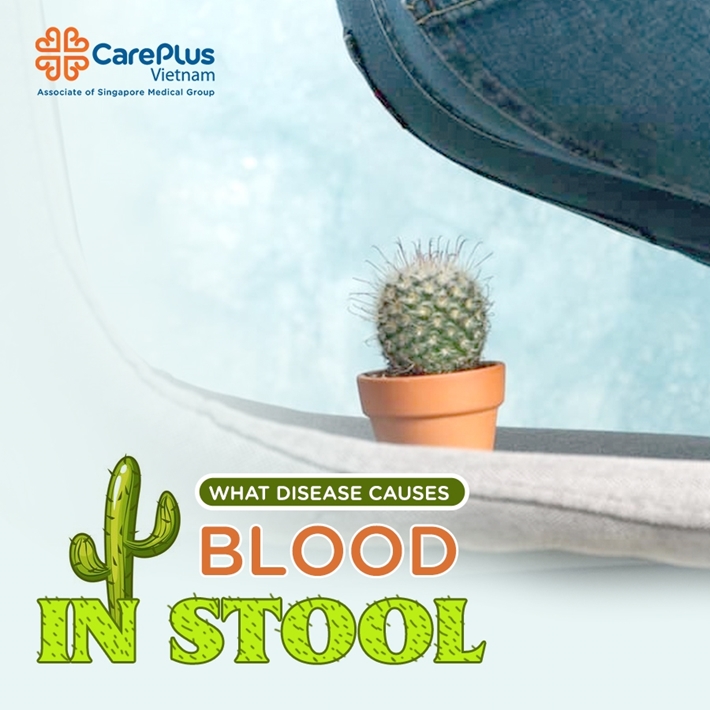What diseases causes blood in stool?
Bleeding in the stool is a condition that can cause great concern for patients and accounts for a large part of the reason for visits to the emergency department or gastroenterology. So when encountering the situation of suspecting blood in the stool, what should we do and how to judge? CarePlus hopes that the following article will be helpful to readers.

8/13/2021 8:17:04 AM
1. UNDERSTANDING WHAT IS BLOOD BASE?
Some conditions make you feel like you have a bloody bowel movement but aren't, like black stools caused by taking medications such as bismuth (common in some Helicobacter Pylori prescriptions) or iron-rich foods (red meat), blood), red stools due to eating red food before. These cases will resolve on their own when the above agents are stopped.
If you have bloody stools, you'll see blood in:
- Bloody toilet paper after defecation
- There's blood in the toilet bowl
- Blood outside the stool or mixed in the stool?
In some cases, the stool may be as black as tar (people often liken it to tar) but not the red color of blood. In that case, it is usually due to bleeding in the upper part of the gastrointestinal tract.
2. REASONS FOR BLOOD?
There are two most common causes of bloody stools, but they are usually not serious:
- Due to hemorrhoids – Hemorrhoids are caused by the hemorrhoidal vessels in the anus dilated, ruptured, causing bleeding. At this time, hemorrhoids may be accompanied by pain and itching.
- Anal fissure, tear - Due to the tearing of the skin in the anus
However, some bloody stools are severe or signs of another severe disease such as cancer or inflammation, ulceration of the intestine or colon
3. WHAT OTHER SHOULD WE BE CAREFUL WITH BLOOD?
Paying more attention to these symptoms may help give you some clue as to the cause and extent of your bleeding:
Itching or anal pain?
- Feeling hot or tearing in the abdomen when having a bowel movement
- Fever, weight loss, or night sweats – often indicative of malignancy
- Diarrhea
- I want to go to the bridge but I can't
- Stomachache
- Black or red stools
- Change in the number of bowel movements during the day or change like stools (more liquid or denser)
- Prolonged or recurrent bleeding in the stool
IF YOU HAVE BEEN BLOOD, YOU SHOULD GO TO A DOCTOR, BUT IF THESE SYMPTOMS ARE SPECIAL ATTENTION IMMEDIATELY.
4. WHAT TESTS CAN THE DOCTORS DO FOR YOU?
Your doctor will decide what test to use based on your age, other symptoms, and your condition. These are the examination methods and tools commonly used by the doctor on a patient with bloody stools:
- Anorectal exam – The doctor will look outside the anus of the patient; the doctor may also use his finger to go into the rectum to assess the inside.
- Proctoscopy – The doctor uses a tube inserted into the anus to examine the rectum (lowest part of the colon). The scope will have a light so that the doctor can see the lesion, if any.
- Colonoscopy – The doctor will insert a small tube into the anus and go deep into the colon. The tube has a camera to see inside. This way, the doctor can take a colon tissue sample for biopsy.
5. HOW TREATMENT OF BLOOD BASE?
Treatment for bloody stools depends on what the cause is. A few cases do not require any treatment. If necessary, it can be:
- Provide more fiber and medicine to soften stools, avoid constipation
- Sit in a bowl of warm water 2-3 times a day, 15 minutes each time
- Apply cream outside or put medicine in the anus. This medicine helps relieve itching, pain, or swelling of the anus
- Other causes of severe bloody stools will be explicitly treated depending on the situation
6. CAN BLOOD-BASE BE PREVENTED?
If you have bloody stools due to hemorrhoids, you can prevent them by drinking lots of water and eating a lot of fiber. Fiber includes fruits, vegetables, or whole grains. In more complex cases, you may need a laxative.
Advice from Dr. DINH THI NGOC MINH - Specialist in General Internal Medicine, Internal Gastroenterology CarePlus International Clinic